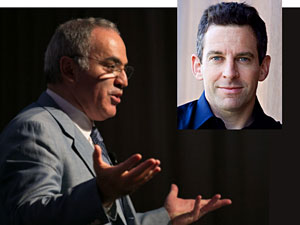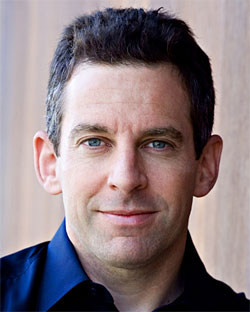


The Sam Harris podcast with Garry Kasparov is 1½ hours long and was conducted on Skype. The bulk of it is devoted to the recent US election, the Russian influence on this process, the problem of waning American power, the rise of Putin, and the coming presidency of Donald Trump. Chess colleagues who have a much deeper understanding of international politics than Kasparov and Sam Harris can ignore this section. They must, however, concede that the level of discourse is very high and the eloquence and verbal skills Kasparov has achieved in his second language are quite remarkable.
In any case if you are so inclined you can fast forward to part on computer chess and the future of intelligent machines, where the opinion of 13th World Champion is undoubtedly relevant. As Sam Harris puts it to Kasparov: "You will go down in history as the first person to be beaten by a machine in an intellectual pursuit where you were the most advanced member of our species. You will have a special place in history, even if that history is written by robot overlords."
The section on Artificial Intelligence, on which Sam Harris has spoken and written about very convincingly in the past, begins at 1 hour 16:20 min into the Kasparov podcast. Harris initiates the discussion with an important point: "Chess is this a quintessential intellectual activity, but it is actually a fairly simple one, similar to the way that music and mathematics can be simple. This is one of the reasons why you have child prodigies in these areas, and you don't have child prodigies in novel writing or political debates or other areas that are different in an intellectual sense. This is one of the reasons why chess was one of the first things to fall to Artificial Intelligence." He goes on to quiz Kasparov about his experiences in the past decades, and Kasparov reveals that he is working on a new book on the subject, Deep Thinking, that is coming out in May 2017, the 20th anniversary of his second match against Deep Blue. Sam announces that there will be a second podcast when it appears, one that we can all look forward to.
Kasparov says [at 1:17:40] that after he beat the computer in 1996 and then lost to it in 1997 he was quite upset that IBM didn't want to play a rubber match [the decider]. "It's a painful story, since I will be entering history as the chess champion who represented humanity in an intellectual pursuit and was beaten by the machine. But the reason I wrote the book is not to settle old scores or give my version of the match, but to say that we should not be paralyzed by a dystopian vision of the future – worrying about killer AI and super-intelligent robots, which is like worrying about overcrowding on Mars."
Even more remarkable is that Kasparov [1:19:10] has had a change of heart: "While writing the book I did a lot of research – analysing the games with modern computers, also soul-searching – and I changed my conclusions. I am not writing any love letters to IBM, by my respect for the Deep Blue team went up, and my opinion of my own play, and Deep Blue's play, went down. [1:21:55] Today you can buy a chess engine for your laptop that will beat Deep Blue quite easily."
Kasparov concedes that he would not stand a chance against today's computer. He says [1:22.25]: "The problems that humans are facing is that we are not consistent, we cannot play under great pressure. Our games are marked by good and bad moves – not blunders, just inaccuracies. They remain unnoticed in human chess, but are very damaging when you are facing a machine." He has a very interesting analogy: 90% accuracy is good enough for translating a news article, but 90% accuracy for driving a car, or even 99%, is a bad day on the road.
So competing with computers in chess is "about our ability to play high-quality moves for many hours. Human psychology works against us. If I have a computer, even a very weak one, at my side, the tables could be turned, and I or some strong GM would be able to beat a very powerful computer, because I can guide the machine and definitely eliminate blunders, the very root of human weakness when facing the computer. That is why I am promoting the idea of combining our forces."
Kasparov is referring to Advanced and Freestyle Chess, where humans are allowed to use computers during their games, a form of play he invented and promoted. "The future belongs to human and computer cooperation," he believes, "man plus machine decision making. We are entering a new era, and there is nothing definite about it – the outcome is not already decided. In the last few decades we have moved from utopian sci-fi to dystopian sci-fi, with machines like the Matrix and Terminator. It could be, but it very much depends on us, on our attitude and our ability to come up with new ideas. It's up to us to prove that we are not redundant."
Listen to the entire interview (or parts that are of interest to you) on Sam Harris' podcast page.
 |
Sam Harris is an American author, philosopher, and neuroscientist, host of the podcast Waking Up with Sam Harris. He is a harsh critic of organized religion, and his books The End of Faith (2004) and Letter to a Christian Nation (2006) are international bestsellers. Harris has also worked on the basis of morals in the understanding of human well-being, and on Spirituality Without Religion (title of a 2014 book). There are countless lectures and debates with him on YouTube, all extremely well worth watching. And you should regularly visit his web site and newspage which currently has almost sixty podcasts like the one above. |
Also: Watch this recent Fox News interview with Garry Kasparov
|